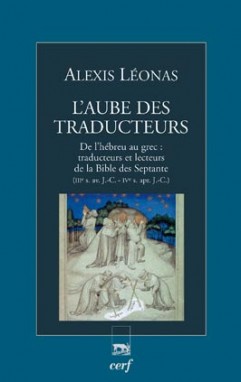Aube des traducteurs (L')
d'
Alexis Léonas
Collection Initiations bibliques
240 pages - févr. 2007
35,20€
« Il était une fois une traduction... » Ainsi commence ce livre qui n'est pas un conte mais qui paraît en raconter un : bien que fruit d'une culture archaïque et étrangère aux Grecs, avorton littéraire en marge d'une culture riche et presque saturée, les Écritures juives, par la grâce de la traduction des Septante, devinrent l'Écriture sainte du monde gréco-romain. Et le conte a perduré : devenu religion officielle de l'Empire romain, le christianisme a instauré la Bible comme son livre de référence, et c'est toujours son statut vingt-trois siècles après cette première traduction. Première ? oui. Dans un monde où toute culture s'enfermait dans sa suprématie (soit contre tout ce qui était « barbare » pour les Hellènes, soit, au contraire, contre tout ce qui était grec, donc étranger, pour les autres peuples méditerranéens – qui résistaient déjà à une première vague de globalisation), dans un monde où les échanges entre les cultures se faisaient par des voies obliques, on ne pratiquait pas la traduction littéraire (l'idée même d'une telle transmission, si coutumière pour nous, était absente de l'horizon intellectuel de l'Antiquité). Et cette traduction improbable a surgi. C'est cette histoire qui nous est racontée : celle des traducteurs, celle des lecteurs, celle des mots et du langage. Des considérations sur l'intérêt philologique et historique de cette première traduction émerge tout naturellement la question du sens de l'Écriture – tel qu'il était pour l'Antiquité tardive, tel qu'il pourrait être pour une modernité tardive.
--
‘Once upon a time, there was a translation…’ So begins this book, which isn’t a tale but which would appear to be telling one. Despite being the fruit of an archaic culture - alien to the Greeks, a literary runt on the fringe of a rich and almost congested culture - the Jewish Scriptures, by grace of the Septuagint translation, became the Holy Scriptures of the Greco-Roman world. And the tale has endured. When it became the official religion of the Roman Empire, Christianity installed the Bible as its work of reference, and that is still its status twenty-three centuries after that first translation. First translation? Yes; in a world where each culture was closeted in its own supremacy (whether it was, in the case of the Hellenes, a resistance against all things ‘barbaric’; or on the contrary, against everything Greek, therefore foreign, for the other peoples of the Mediterranean, who were already resisting a first wave of globalisation), in a world where cultural exchanges were conducted in roundabout ways, literary translation was not practised. Even the notion of a such a transfer, so routine for us, was absent from Antiquity’s intellectual panorama. Then, that most unexpected translation suddenly appeared. And it is this story the author is telling: that of the translators, the lectors, the words and the language. From reflections on the philological and historical interest of this first translation, the question of the meaning of the Scriptures naturally emerges – what it meant in late Antiquity, what it might mean for late modernity.
- Dimensions : 135x215x15
- ISBN : 9782204080354
- Poids : 320 grammes
